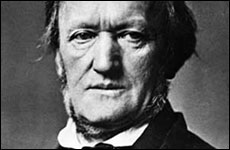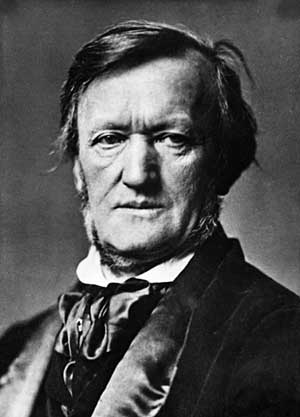 Iran’s Attack on Israel
Iran’s Attack on Israel


5 min read
Not your garden-variety Jew hater.
There is little doubt that the great German composer Richard Wagner was one of the most virulent anti-Semites in modern history as well as being Adolf Hitler’s most revered cultural role-model. Nor can it be seriously disputed that his music arouses the most painful associations in many Holocaust survivors still living in Israel.
Hence, admirers of Wagner’s music, despite their strenuous efforts to separate the man and his racist beliefs from the sublimity of his art, have never been entirely successful in shaking off the indelible taint of Nazism and the death camps attached (rightly or wrongly) to his name.
At first sight, this might seem unfair given that Richard Wagner was born 200 years ago (May 22, 1813) and died 50 years before Hitler came to power in Germany. Not only that, but Wagner was far from being the only leading European composer or prominent artist of his time to exhibit antipathy toward Jews. One thinks of Liszt and Chopin or painters like Degas and Renoir, not to mention renowned writers such as Dostoevsky.
Moreover, Theodor Herzl, the visionary founder of the Jewish State, was himself powerfully impressed by Wagner’s creations precisely at the time he laid the conceptual basis for political Zionism.
 So, what is it about Wagner’s attitude to the Jews, or his music and personality, that can explain the deep resistance to public rendition of his works in Israel? And is it, in fact, correct to see in Wagner a kind of proto-Nazi before his time? Or should we be more forgiving along with Thomas Mann (a passionate Wagnerian who became an astute critic of the Master)? What, indeed, we might ask, would modern music be without Wagner’s aesthetic revolution, his universal artwork (Gesammtkunstwerk) of the future, his dramatic expressiveness or masterful merging of text and music? Even the legendary Jewish conductor Leonard Bernstein had to admit: “I hate Wagner, but I hate him on my knees.”
So, what is it about Wagner’s attitude to the Jews, or his music and personality, that can explain the deep resistance to public rendition of his works in Israel? And is it, in fact, correct to see in Wagner a kind of proto-Nazi before his time? Or should we be more forgiving along with Thomas Mann (a passionate Wagnerian who became an astute critic of the Master)? What, indeed, we might ask, would modern music be without Wagner’s aesthetic revolution, his universal artwork (Gesammtkunstwerk) of the future, his dramatic expressiveness or masterful merging of text and music? Even the legendary Jewish conductor Leonard Bernstein had to admit: “I hate Wagner, but I hate him on my knees.”
The Wagner debate is not an easy one to resolve, least of all at a time of resurgent anti-Semitism in Europe. Already in his notorious early tract Jewry in Music (1850), Wagner had identified the Jews as “the plastic demon of the decline of mankind” – decadent symbols of the corrupt, money-making new world that the composer loathed.
In 1881, he wrote to his infatuated patron, Ludwig II of Bavaria: “I hold the Jewish race to be the born enemy of pure humanity and everything noble in it.” Wagner even suggested that he was “the last German who knows how to hold himself upright in the face of Jewry, which already rules everything.” No wonder that the young Adolf Hitler could see in Wagner a true soul-mate and remained to the end a fanatical worshipper of his boyhood idol.
What the two shared, however, was far more than simply visceral Jew-hatred. Hitler was enchanted by the ecstatic appeal of the great Wagnerian themes of heroic sacrifice and betrayal, redemption and death, the restored world of Germanic myths, of titanic passions and the twilight of the gods. Hitler, like so many Wagner addicts, felt transported by Wagner’s music into a mystical trance, plunged into a mesmeric spectacle of heroic beings like Rienzi, Tannhäuser or Siegfried who appeared to challenge the established bourgeois order; or ascetic saviors like Lohengrin and Parsifal come to redeem a corrupt and degenerate world. In Hitler’s twisted imagination, Parsifal was ultimately a drama about “blood purity” and racial regeneration: a distortion perhaps, but these ideas certainly preoccupied Wagner in his last years.
There is also a sense in which Hitler may indeed have seen himself as the political consummator of Wagner’s artistic genius and the Nazi Reich which he founded as a grandiose fulfillment of the Wagnerian Gesammtkunstwerk. Purging Germany (and Europe) of its Jews fit perfectly into this broader world-view oriented towards “racial cleansing.”
It might, of course, be objected that Wagner can hardly be held responsible for the monstrous way in which the Nazis implemented some parts of his vision half a century later. Moreover, many Wagnerians – then and now – were utterly remote from Nazism. Indeed, some were self-proclaimed humanists, socialists, feminists, vegetarians and free-thinkers.
Nevertheless, there were perceptive critics such as the German philosopher Nietzsche, who divined as early as 1888 the possible consequences of the Wagner-cult at Bayreuth. Nietzsche (a former admirer himself) shrilly denounced Wagner’s art as diseased, narcotic, morbid, hysterical and brutal. His scathing portrait of Wagner as a master of hypnotic trickery, a neurotic tyrant with an actor’s genius, an incomparable histrionic personality – seems at some points to uncannily prefigure Hitler.
It is also worth noting in this anniversary year that it was Nietzsche’s break with Wagner that finally freed him from the incubus of Bayreuth’s anti-Semitic tradition. Nietzsche himself was of course used and abused by the Nazis, no less than Wagner. Nevertheless, there was an important difference. The manipulation of Wagner’s legacy in the Third Reich really had solid roots in the art and ideology of the “master of Bayreuth.
